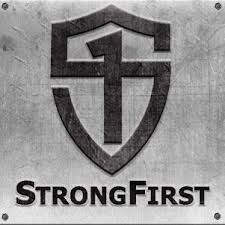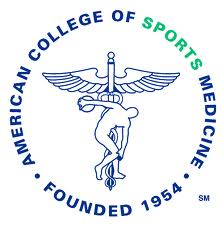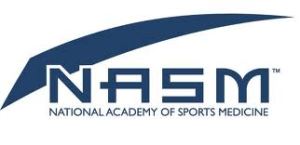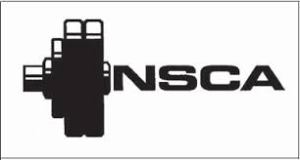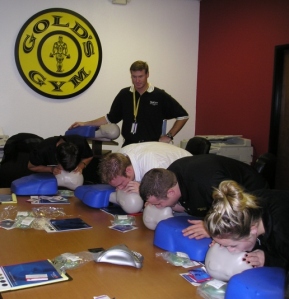I proudly served in the United States Navy for twenty-four years. During that time I had the pleasure of working alongside and knowing many exceptional female leaders. Many have since retired while others are still serving our country. They continue to lead and inspire others daily, and the military is a better place with them in it.
Since retirement I’ve had the pleasure of training numerous female athletes and helped others become stronger and fitter versions of themselves. Further, I have been blessed to network with exceptional coaches from around the world and continue to learn from the them all the time.
The subject of strength training for women, both for its benefits and training differences that exist between genders (Which isn’t really isn’t as much as some would think) has been covered thousands of times by people much smarter that myself.
What I haven’t seen very many articles covering is the viewpoints of ladies representing a wide range of ages and training backgrounds. This weeks blog is the viewpoints of some exceptional female coaches from across the USA from their twenties and up.
I asked the question “How has strength training benefitted you in life?”
These are their stories…
Twenties…
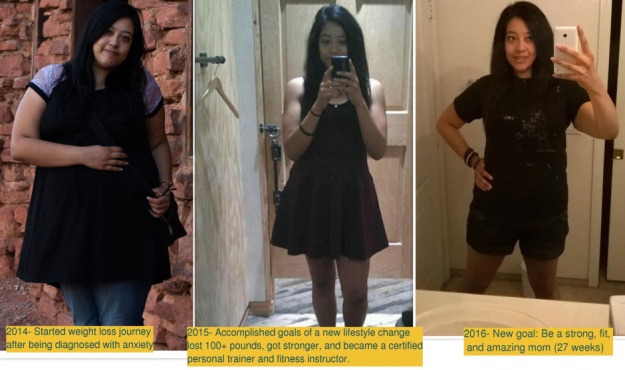
Elizabeth Coronado-Ledenich, 26 years old, NASM CPT
Las Vegas Nevada, Life Time Athletic and EOS Fitness.
liztrainerlife.wordpress.com
lizcoronado08@gmail.com
“In order to understand what strength training brought into my life I must first start by sharing a little bit about my past. In 2012, I had dealt with some drug related issues one of which landed me in the hospital for overdosing. I never once thought that I was unhappy. I weighed close to 300 pounds and that never raised a red flag for me. I never lacked self esteem or had body image related problems so I never thought there was a problem.
It wasn’t until 2013; one night, after smoking marijuana in my friends closet that changed my life. I walked out to the room and at the time I didn’t know what I was experiencing but it was an anxiety attack. It continued like that for weeks. My mental instability led me to believe I really was going to die and it was only a matter of time. I was so desperate to find a solution to why I was feeling this way and advice from friends led to eating better and exercising. I had nothing else to lose so I gave it a try. I started eating better and going to the gym and my path to health started.
I worked on building healthy habits and started seeing the weight come off. Most importantly I felt so much better and the panic attacks started going away. I discovered so much more about myself during this time. It wasn’t until I lost about 60 pounds that I became interested in becoming a personal trainer to share with others the importance of fitness and nutrition in life.
I stopped teaching middle/high school to attend a personal training class to pursue my new career path. I had a lot of doubters and people that tried to discourage me from continuing on this path. I think it was mainly because I didn’t look like I “worked out” and still had weight to lose. During this class I met two amazing people that propelled me to new heights. First person was a student in my class who is one of my best friends to this day; Jean, who kept me focused on my path and goals regardless of the naysayers. The second person was someone who I met during my internship hours and his name is Chris (The author of the blog and amazing coach and mentor) I shadowed him training clients a couple of times. Before meeting him I had never picked up a barbell and I had only messed around with light dumbbells.
One night after getting signed on my hour of shadowing I made a comment that I had never even touched a barbell and in that moment Chris walked over to get one. I will never forget this night. He started teaching me how to press it over my head. Already in my head I was thinking “there is no way I’m going to be able to press that thing over my head but I’ll try because it looks like fun,” I walked over and held it in my hands as Chris started giving me cues on what I needed to do and incorporate every part of the body to assist with the lift. With that I pressed it over my head. I remember looking in the mirror and being in shock that I was actually doing something I had already told myself I would not be able to do at all yet. I put the barbell down and the first thing he said was “You’re so much stronger than you think you are,” I went home that night just thinking of how amazing that felt and how I wanted to get stronger. (Chris you’re the best!)
Strength training has brought on physical, mental, and emotional strength in my life. I look in the mirror and I love the person I have become. I am a completely different person than I was back in 2012 and a lot of it is due to the fact that I have become a stronger individual. I gained confidence, and lost the anxiety attacks. I love going into the gym and thinking “How much stronger am I going to get today,” Strength training led me to teaching fitness classes and becoming a much more well rounded personal trainer. Now in 2016. Strength training and breathing techniques helped me during the natural birth of my newborn son and it will continue to help me to be the best I can be.
Thirties….
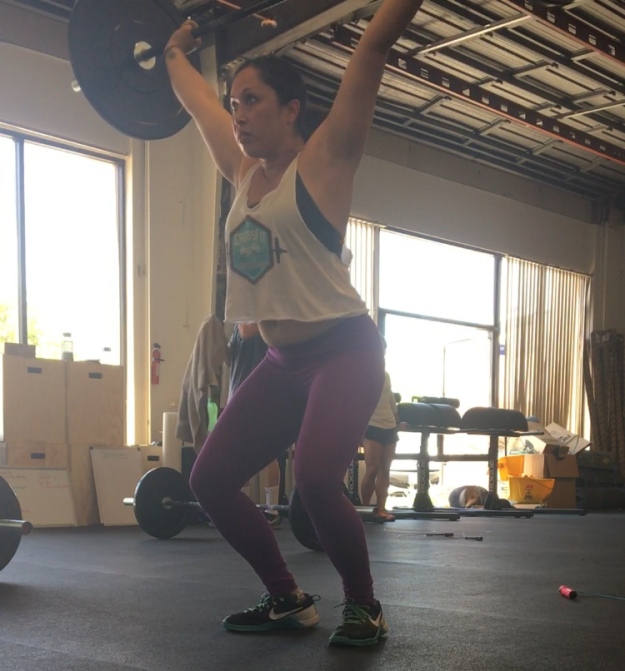
Naomi “Coach Ninja” Recania
CrossFit CF-L1, CrossFit Kids, CrossFit Mobility Trainer, USAW Level 1 SPC, NASM CPT/YES
Santa Barbara, CA, USA; CrossFit Santa Barbara
http://www.crossfit-santabarbara.com
http://www.facebook.com/crossfitsantabarbara
Instagram: @crossfitsantabarbara
“ I noticed at a young age that I was stronger than other kids. Athletics, dance – anything that required body awareness and strength came easy to me. However, I always felt emotionally different than others. I am extremely sensitive and feel life very deeply. Twelve years of competitive gymnastics allowed me to grow mentally and emotionally, but I still felt incomplete. It wasn’t until I found CrossFit that I was able to understand and learn how to cope with my emotions.
Inc. magazine published a fantastic article the other day entitled “5 Reasons Why So Many Entrepreneurs Do CrossFit”. One paragraph in particular stood out as it encapsulated my views and purpose for participating in the program since 2010: “Pushing yourself to develop strength and skills in areas where you’re not naturally gifted… helps you push past your own belief systems around what you’re capable of doing. It breeds fortitude and mental strength.”
It was the belief systems that I, and others, had created that prevented me from reaching my potential in various aspects throughout my life. Once I was able to break through those barriers, I grew immensely – not only physically, but also emotionally and intellectually. As such, I am now Owner and Head Coach of CrossFit Santa Barbara, and the gym is thriving. It is through my physical strength training in CrossFit that I attribute my continued growth of “fortitude and mental strength” that I am able to apply to all aspects of my life.”
For above-mentioned article: http://www.inc.com/tanya-hall/5-reasons-why-so-many-entrepreneurs-do-crossfit.html
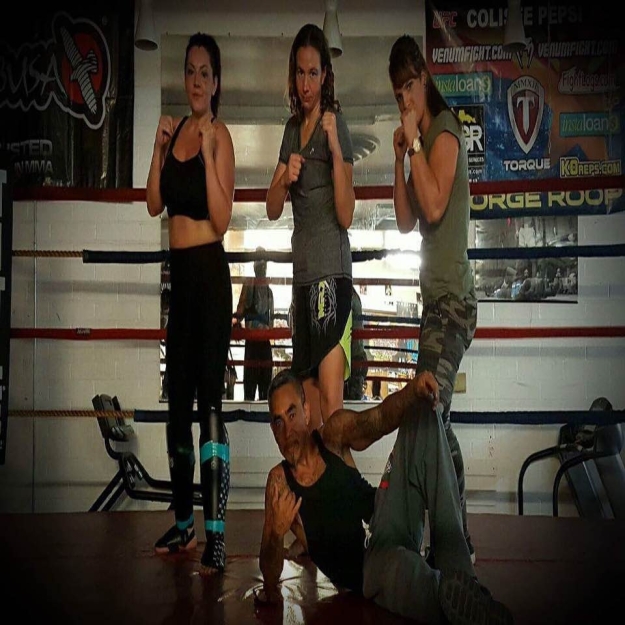
Nyki Harrington NASM-CPT, PN1 Coach (Far Left)
Tucson, AZ – currently with UFC Gym North Tucson Strength and Conditioning Coach/Kickboxing Instructor
520-481-8833 – nyki.ufcgym@gmail.com
“I’m a chick. Obviously. But I think I did things backwards according to the so-called status quo of chicks who workout; I’d choose to up my PR on bench press over run on a treadmill any day. Strength training hasn’t simply brought something to my life, it has brought life to my strength (oh that sounded so cool!).
I’m also a fighter but I would’ve never been able to become a fighter without strength training myself, being that I’m in my 30’s, a mother of three crazy monsters, a history of arthritis (for reals…) and was overweight my entire life; losing close to 100lbs overweight. I mean, I would get winded checking the mail and now I roundhouse kick others girls in the face, how awesome is that?! I would never have the confidence nor the general ability to poise myself to learn boxing, kick boxing and now Muay Thai without strength training.
IT DOES NOT MAKE YOU LOOK LIKE A DUDE! I can lift heavier than my husband on most days and trust me, he looks like a dude, I do not. I feel strong, confident, sexy and my basal metabolic rate has increased while my body fat has decreased, I was once 46% BF now sitting at a comfortable 17% and still dropping.
With my clients – I have successfully built an impeccably strong army of female warriors who walk up to the free weights like a BOSS. They are no longer scared to do those “guy routines” and in turn have also seen the same results as myself. Strength training is as important as nutrition and I wouldn’t trade my kettlebell for all of the treadmills in the world. (no offense to treadmills)”
Forties….
Liz Jones: BA, MAOL, RYT, CPT, CMWA, Nutritional Therapist
Wylie, Texas (Dallas)
WEBSITE: www.lizjones.co
FACEBOOK: https://www.facebook.com/lizjones.co/
“I have been strength training since I was a teenager and have gone through ups and downs with my fitness throughout my life. I am now about to turn 45 in October and can say that strength training, along with stress management and nutrition, is one of the things that has helped to keep me young and manage my health through the years.
Personally, strength training has empowered me in many ways, helping to keep my body strong helps to keep my mind and resolve strong as well. I love the acronym SWEAT She Will Endure All Things- which I have on a tank top that the company donates proceeds to domestic abuse programs.
When my son was 14 (he is now 26), he was in a terrible accident that put him in a coma which lasted for ten days. They were not sure he was going to make it. This weekend is the 12th anniversary of his accident and it is hard not to reflect on the pain and tragedy of that time of our lives, but it also, in all it’s horribleness, also made us stronger in many ways. Physical strength and fitness helped to get me through a time when I needed all the strength I could find from within. I lived at the hospital with him for a month and six days before we were able to go home and would do yoga by his bedside, run in the parking ramp and use the free weights in the physical therapy room while he was in sessions. It was one of the few things that kept me sane during an emotional crisis watching my child go through terrible pain and suffering.
It also helped me as a single mother to be strong and to raise a son to know what strength looks like, both physically and philosophically.
When I work with clients, many of whom are women in their 40’s and 50’s (I work with all ages and genders, but my primary audience is middle-aged women) I always talk with women about body awareness, self-acceptance and self-esteem. We focus a lot more on gaining strength over time that we do on scale weight. I teach women the importance of weight training and how much it makes a difference in their longevity and in functional fitness. If you have children or grandchildren, you need to be able to pick up 50-70 pound without being injured. Doing yard work, maintaining a healthy sex life, preventing bone fractures and hormonal issues are all affected by strength training.
Having energy to get through your daily routine whether you work in an office, in your home or a combination of the two is something women of all ages need to focus on. Weight training is vital to a woman’s health and wellbeing. I make all of my clients work on their Wonder Woman pose while training, because not only does it help them get in correct form and good posture, it is a powerful stance that creates strong energy. I teach women to honor their bodies and to be women of strength.”
Fifties….
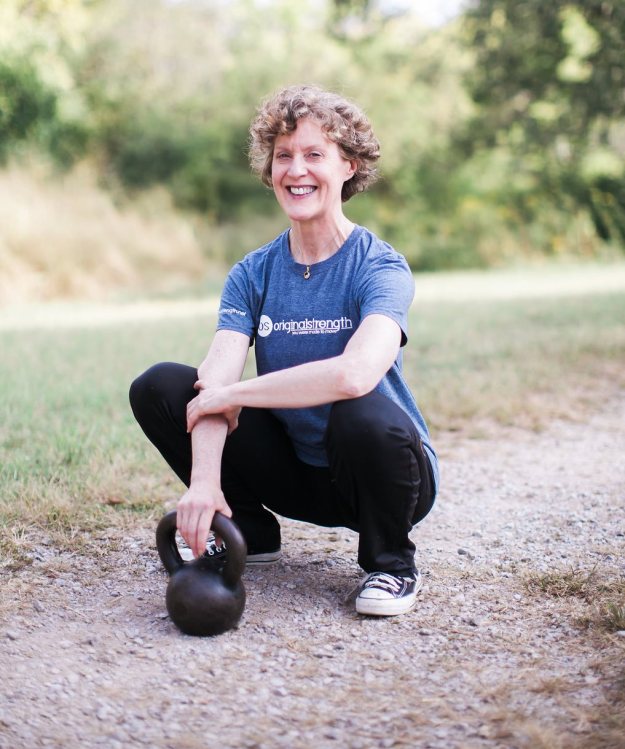
PJ Olsen (age 57) StrongFirst SFG I, Original Strength Certified Coach, Certified Yoga Instructor, FMS Certified, Yoga Therapist (in training)
Nashville, TN
Restorative Strength and Music City Kettlebell
Website: http://www.RestorativeStrength.com
Facebook: https://www.facebook.com/Restorative-Strength; https://www.facebook.com/musiccitykettlebell/
“Although I have strength trained most of my adult life, it’s really been in my 50’s that I have found it to be the most rewarding and transformational! At 50, I was suffering regularly from running injuries, and the poor posture that resulted from sitting behind a computer at work 10 hours a day was taking its toll on my body.
I then discovered kettlebell training which completely changed my life! It quickly improved my overall strength, mobility, and endurance like nothing else ever had! I was so inspired by my own results that I went on to pursue my kettlebell instructor certification at the age of 53.
Physical strength is empowering! Strength training has allowed me to step outside of my comfort zone. It has helped push fear back in the corner where it belongs and provided a way of dealing with everyday stress. My desire and ability to learn new things has increased dramatically…and has even set me on a new career path that I am so passionate about!
With my continuing education in kettlebell training, Original Strength, and Yoga (and currently in training to be a Yoga Therapist), I now have skills and knowledge to help others…especially those over the age of 50…rediscover the joy of moving well so they may enjoy an improved quality of life! I feel truly blessed that strength training has provided me my purpose in life!
I truly appreciate this opportunity to help spread the love for strength training! I hope that I inspire someone in my age group to go pick up a kettlebell…or start crawling!”
Namaste,
PJ
Sixties….
At present I do not have any female coach friends in their sixties. The below viewpoint was provided via the clients coach. (MTC)
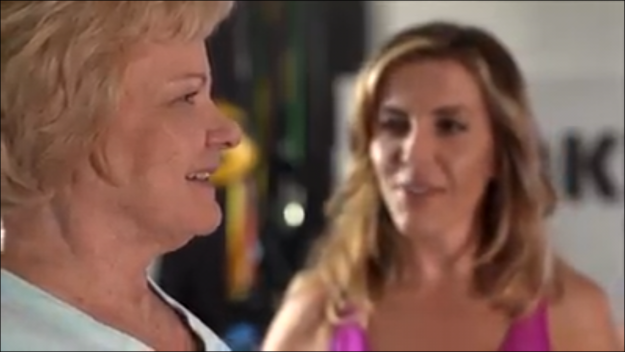
Claudia (Left) with her coach Rocky Kitzmiller.
Rocky Kitzmiller, MS,MAED,NASM WLS,CPT,HKC
RockBody-Fitness, LLC
Virginia Beach, VA
http://www.facebook.com/rockysrockbody
rockbody-fitness.com
“I have pretty much been working out all my life. Through strength training I have had the ability to fight through menopause. At 66, training to keep my strength, stability, and flexibility is even more important than before. Once retired, I have had more time for travel and adventure. My golf game is still improving and having the ability to play is important to my wellbeing. I look forward to more travel including such places as Machu Picchu and the Galápagos Islands. To be able to enjoy life’s adventures, I need my strength and need to continue to train throughout life to maintain. I will continue to climb mountains and jump into the waters as long as I can. I’m far too young to stop now!”








